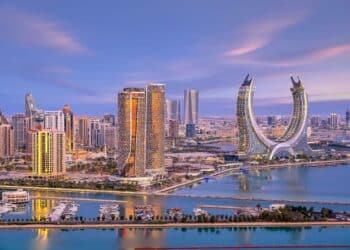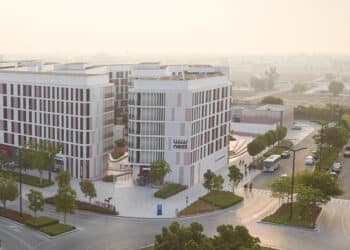
An exclusive whitepaper produced for Arabian Travel Market (ATM) by Digital Tourism Think Tank (DTTT) has highlighted that only 15% of UN Sustainable Development Goals (SDGs) related to tourism are on track to be achieved by 2030 according to the body, underscoring the need for more action to be taken across the sector.
Based on United Nations (UN) research, in a business-as-usual scenario, by 2050, tourism could generate a 154% increase in energy consumption, a 131% increase in greenhouse gas emissions, a 152% increase in water consumption, and a 251% increase in solid waste, underscoring the importance of increasing investment in sustainable development. Furthermore, Visa and Oxford Economics research has revealed that consumers face insufficient information and a lack of transparency about sustainable travel options.
Addressing these challenges, the whitepaper Exploring the Future of Tourism Technology utilised the insights from the ATM Innovation Wall during the 2024 edition of the show. The unique physical platform encouraged industry professionals to share their ideas, concerns and solutions for the future of tourism. Key takeaways proposed ranged from gamified recycling programmes to hyper-personalised travel experiences that emphasise cultural immersion, demonstrating the breadth of creative thinking required.
Participants highlighted the urgent need for systemic, collective action to transition tourism toward a circular and regenerative model. Proposed solutions included leveraging innovative technologies for resource optimisation, aligning businesses with local communities to ensure equitable economic benefits, and promoting transformative initiatives like cultural immersion experiences.
Nicholas Hall, Founder and CEO, Digital Tourism Think Tank, said: “The discussions around sustainability in tourism with people who visited the ATM Innovation Wall highlighted the multifaceted nature of the challenges we face. The path towards a sustainable future requires a multi-pronged approach, from managing plastic waste to fostering responsible travel behaviour and ensuring tourism benefits local communities.
“A key takeaway was the importance of considering diverse perspectives. Sustainable tourism cannot be achieved through a one-size-fits-all approach. By fostering collaboration between stakeholders across the industry, from tech giants to local communities, we can leverage a wider range of expertise and perspectives to develop effective solutions,” he added.
Governments have undertaken several initiatives and strategies throughout the GCC to focus on tourism and sustainability. These include the UAE Tourism Strategy 2031, the Saudi Vision 2030, the Qatar National Tourism Sector Strategy 2030, the Bahrain Tourism Strategy 2022-2026, the Omani National Tourism Strategy, and the Kuwait 2035 Vision.
Sustainable tourism will remain a key area of focus during the 2025 edition of ATM, which takes place under the theme “Global Travel: Developing Tomorrow’s Tourism Through Enhanced Connectivity”. Several sessions are designed to share sustainable practices and address the ethical methods driving the sustainable tourism agenda.
Danielle Curtis, Exhibition Director ME, Arabian Travel Market, said: “Arabian Travel Market (ATM) is proud to provide a vital platform for the tourism industry to advance its sustainability goals. By fostering collaboration, ATM encourages the development of region-specific sustainability frameworks that integrate environmental, social, and economic dimensions.
“The event highlights the importance of investing in innovative resource management technologies and forging cross-industry partnerships to promote a thriving circular economy. Moreover, ATM advocates for community-driven tourism strategies that empower local populations, preserve cultural heritage, and enhance destination resilience. Together, we can drive meaningful progress towards a more sustainable future for global tourism.”
In 2023, as part of ATM’s 30th annual event celebrations, the show initiated 30 short-, medium- and long-term sustainability goals. The 2024 edition introduced various measures, such as using fully recyclable carpet and PVC-free vinyl for all signage and graphics. Working closely with the Dubai World Trade Centre, ATM diverted 48% of waste from landfill, up from 5% the previous year.
Staff training was also provided, as were initiatives with Sparklo, a global cleantech company promoting recycling through reverse vending machines (RVM). As a result, over 2,200 bottles and cans were collected, averting 300kg of CO2 emissions.
Held in conjunction with Dubai World Trade Centre, ATM 2025’s strategic partners include Dubai’s Department of Economy and Tourism (DET), Destination Partner; Emirates, Official Airline Partner; IHG Hotels & Resorts, Official Hotel Partner; and Al Rais Travel, Official DMC Partner.
The latest ATM news stories are available at https://hub.wtm.com/category/press/atm-press-releases/.


































































